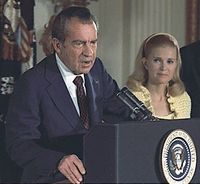Think of this as Volume 17, Number 46 of the newsletter I have written weekly since March, 1997. Enjoy.

Watergate delayed the conservative movement's march to power by nearly a decade. They'd had a 60-40 win over McGovern, they were well on their way to taking over the South, but because Nixon over-reached, because he was inherently distrustful of democracy – as other conservatives remain – we had six years of what was, in hindsight, an apotheosis of liberalism.
Democrats are, en masse, threatening to make the same mistake, turning away from Barack Obama.

They call the Obama Administration bad for civil liberties, bad for peace, bad for the environment, bad for the Internet and bad for democracy.
To a great extent, they're right. As is the case whenever the political winds shift, the grassroots will leap while leaders slowly walk.
This has been true in every period of crisis.
The “Radical Republicans” were condemning Lincoln long before his assassination, and waged war against Andrew Johnson for following Lincoln's policy toward the South.
- Liberals hated the Progressive movement, and its dependence upon Wall Street titans like J.P. Morgan and John D. Rockefeller, who used it to re-make the landscape and market under its regulatory rules.
- Leftists called Franklin Roosevelt squishy, and preferred such men as Huey Long and (later) Henry Wallace, who promised more radical change.

The business of that convention was to endorse a 1972 Presidential candidate, and we hated Nixon as badly as any liberal kids. We chose Ronald Reagan instead, with James Buckley as his VP, and many of us later trooped into New Hampshire on behalf of Rep. John Ashbrook , an obscure Ohio congressman who remained so for the rest of his life.

Point is, I know what I'm talking about here. You believe in something, you demand perfection, and you wind up losing, for years. Unless victory is validated, it can be taken away.
Reform, in any direction, is a slow and steady process. Crisis leaders, once the crisis is over, have to slow down their own supporters as much as they have to face the foe. What Barack Obama is going through now is, from the perspective of history, fairly normal.

To their credit, many media cheerleaders for the Netroots, people like Rachel Maddow and Markos Moulitsas, are urging caution here. Maddow has noted, quite rightly, that the roll-out of RomneyCare in Massaschusetts was just as slow 6 years ago as Obamacare's is now. Moulitsas has written approvingly of the “fix” championed by Conservadem Mary Landrieu, and endorsed by the President.
Yet over 20 House members rejected that fix, in favor of what House Republicans proposed, a carte blance for health insurer abuse that threatens to derail the whole program. I've been getting hammered on social networks for supporting the President, by people who used to call themselves Sensible. I can understand it, but I don't have to like it.

Fundamental change in America generally requires super-majorities. Lincoln had his. Theodore Roosevelt got his after McKinley was killed. Franklin Roosevelt had his. Reagan had Nixon's. This is what Barack Obama is trying to build, in time, starting with his rhetoric, then moving into government, and finally touching people where they live.

That is not the way politics works. The business of America is business. The side that wins business' support wins, over time. Right now, business is trying to decide whether it stays with the GOP, despite the Tea Party, or whether it makes common cause with Democrats and, in time, endorses real reform, as it did in the Progressive Era.
Democrats don't have to win business' loyalty. They just need a piece of it. With the loyalty of big business Democrats can dominate for a generation, and get done all the reforms they want to get done. They just have to take yes for an answer.
Saying no gives all they've built back to the Republican Party, and takes America backward.











